#out of context limited life spoilers
Note
Theres a confessional booth and you wont believe who the priest is
Hands trembling…..need to draw….WHOEVER…..w that slutty priest collar thing…………
3K notes
·
View notes
Text
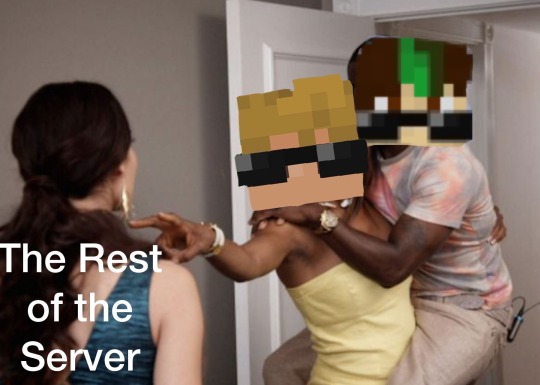
#smallishbeans#joel smallishbeans#limited life#mcyt#solidaritygaming#jimmy solidarity#minecraft limited life#limited life episode 4#limited life spoilers#limited life out of context#i love my bad boys so much
583 notes
·
View notes
Text
The way that Jimmy didn’t even try to stop it, though. The way the realization hit him immediately, and the way he was just so resigned. He didn’t go for his water bucket, or his enderpearls, he didn’t shout anything, he didn’t look around and flail desperately. He just stared in disbelief at the ground coming up to swallow him whole. He was just so resigned, so done, he just didn’t even try to prevent what he knew (or thought) was inevitable. He’s the canary. Of course he dies first. And there’s nothing he can do about it, so why even try?
#ME WHEN IM NORMAL#this is so fun god what an episode#lmaooooooo Jimmy 😭😭 canary calls I guess ALLAJFKAJF#tw emojis#trafficblr#traffic spoilers#out of context that is the funniest damn tag#traffic smp#spoilers#limlife smp#limited life#limited life smp#lilsmp#lilsmp spoilers#jimmy solidarity#solidaritygaming
134 notes
·
View notes
Text
Now that the season has concluded, I can’t wait for Limited Life: Out of Context.
Featuring such glorious lines as: “against a fellow cocker!” and “I can’t beat off four people!”
#limited life smp#limited life#limited life spoilers#limited life series#traffic life series#traffic life#trafficblr#mcytblr#traffic life spoilers#traffic life season 4#out of context#limited life out of context
45 notes
·
View notes
Text
so what the fuck is this family tree why are you all related now werent you all fucking last season????
26 notes
·
View notes
Text
Martyn’s secret life episode one out of context:


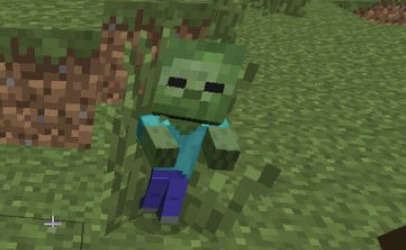
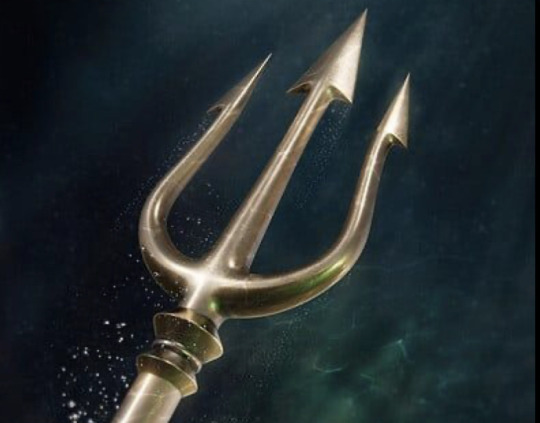
#funny#meme#funny meme#hehe#trafficblr#third life#last life#double life#limited life#secret life#mcyt#life series#traffic life series#itlw#secret life spoilers#spoilers out of context
13 notes
·
View notes
Text
so you literally asked the guy who impulsively pushes every button he can find to choose yes or no and expected him to maybe not say yes???
15 notes
·
View notes
Note
etho counting down from 10 in a very hot way
the disgusting little giggle that came out of me at this one. AUGHDMCKCNF
#distraught.#preemptively making this one unrebloggable PFFFT#out of context spoilers#limited life spoilers#vonswayenthusiast.answers
11 notes
·
View notes
Text
Major spoilers for dungeon meshi ahead, but I really wanna talk about it.
I really love how the demon is handled. It's not just simply evil. Like every other character in the series, it's motives make perfect sense in context. What happened is one of my favorite ideas to play with in fiction. We all know about cosmic horror, and the madness that comes from perceiving their reality. And the demon, being an infinite being from another dimension, certainly is that. And it does spread chaos in its wake. Infinite mana destroys those who wield it in the end. They become foie gras.
But the truth is that it went both ways. The demon was corrupted by a finite world, where once you eat, once your desires are fulfilled, that's it. Things end. The demon is driven mad by consuming desire, by coming to understand this eldritch place it found itself in. It wished for a paradise where desires are forever fulfilled and it could feast forever. It's infinite mind couldn't accept the limitations of mortal existence. It was never equipped to understand hunger, nor could it ever be filled.
Just like a lone traveler who feasts with the fey, it couldn't go back to the way things were before. It needed more, and the only way to do that was to consume everything, forever.
It might hate Laios for what he did, but he saved it from an eternity of unsated gluttony. Bringing everyone to its realm was doomed to fail. For an infinite being, even all life won't be enough to satisfy. That how infinity works. And that's not getting into the fact that this was the only way to defeat the demon without stripping magic away from the world forever. The demon might just figure out just what a favor Laios did for it, though it might be centuries later. Recovery from addiction is never easy.
Anyway, I just think the way they handled it was neat. Alien is purely subjective. The demon was no more prepared for the mortal world than the mortal world was for it.
613 notes
·
View notes
Note
Hi! I'm not sure if you take requests so if you don't, please ignore this and I hope you had a wonderful Christmas.
I just read your Astarion X Tav fanfic where Astarion proposes. It is said that the ring he got glows whenever Astarion thinks of Tav. I was just wondering if you could write a slice of life about the ring glowing at the most random times. Maybe during a stealth mission where Tav has to stay hidden or when he is smiling in his sleep and the ring glows. I just thought it would be cute and fun to write about. You can get creative with it.
Thank you for taking the time to read this, whether you end up doing this request or not. I hope you had an amazing Christmas and I hope you will have an amazing New Year's!
Hi Anon! I don’t think this is quite what you were asking for but… this is what came out! 🤷♀️ The smut gods blessed me and I cannot deny their gifts. Merry Christmas and Happy New Year! Smut below the cut.
If you haven’t read my other work and would like context, Anon is referencing a two part mini story I wrote. Click here for part 1, and click here for part 2.
Warnings/Tags: 18+ only please, smut, masturbation, sex pollen, swearing/cursing, game spoilers
Word Count: 1.5K
-----
“I think we’re just… a bit out of practice, darling. It has been nearly a year since we were down here last, you know.” Astarion whispers, crouched next to you behind a Funguswood tree. He’s wiping bits of dirt, twigs, and mushroom pollen off himself with a handkerchief.
“Admit it, Astarion. You just weren’t fast enough.” You respond with a small, teasing poke of your tongue as you rearrange your weaponry and count your arrows.
The pale elf finishes wiping off the debris, and you return your attentions to the mission. You’d been contracted to scout out the vampire stronghold in the Underdark and report your findings back to Wyll and the Flaming Fists. Rumor was that the vampire hoard had wreaked absolute havoc on the Underdark; the city feared the creatures would soon return to the surface if they could not find sustenance here.
“Would you have preferred I let that wild Rothé ram you into those mushrooms in my stead?!” Astarion hisses in return while rubbing his hand over his arm, which now felt unbelievably tingly and was starting to radiate significant warmth, “Hells, what mushrooms were those, anyway?!”
You stifle a chuckle, knowing your fiancé is already past his limits of patience. You two need to get to the scouting point, set up camp, and hunker down for a few days… all while avoiding detection from the vampires or any other nefarious creatures in the Underdark. Best to do it without an ornery Astarion by your side.
“I don’t know what mushrooms those were. I’ve never seen them before.” You admit with a small shrug, “Come on my love, not much further now and then we can get you properly cleaned up.”
Astarion follows behind you in silence, apart from the occasional cursing and swiping at his skin. Gods, the heat had spread up his entire arm now. The scratching seemed to make it worse, but by the hells, he couldn’t stop no matter how much he wanted to. The two of you finally got to the cragged rock that led to a small cave where you would make camp, and he never felt more relieved in his life. He couldn’t wait to clean himself properly and be done with this burning sensation.
You glance at him briefly and then begin climbing the rock. Astarion remains below to keep you covered in case anything decides to attack while you’re left defenseless. He looks up to watch your progress and cannot help but to notice the overwhelmingly attractive curve of your bottom. It was always attractive, of course, but something about it in this moment was entirely… irresistible. Had you been working out recently in preparation for the wedding?
You’re halfway through climbing the rock when your engagement ring bursts into a spray of light. It often glows significantly at the surface, but in the blackness of the Underdark, you’re practically a beacon. Your stomach drops. Gods, how had you forgotten to take it off?
“Astarion!” You hiss in a panicked whisper, “Cut it out! Every being in all of the Underdark will know our position.”
Astarion had realized the issue as soon as the light had flared, of course. He was trying desperately to avoid thinking of you and all the delicious things he wanted to do when you two made camp, but gods he couldn’t control it. What in the hells was wrong with him? He wanted to stop, to ensure your safety, but your plump, perfect ass was practically calling his name, begging for his attention, and he wanted nothing more than to bend you over and—
He shakes his head, trying to rattle the lewd fantasies from his psyche, “I’m trying, my love! I don’t know what’s come over me I just—“
Hags. Hideous shoes. Ghouls. Manual labor. Gale.
The pale elf tries to think of all the most grotesque, unsexy things he can and push you entirely from his mind. You continue to climb, hoping to quickly reach the top and take off your ring as soon as possible. The ring is still glowing like a single star in the blackest night.
Ogres. The smell of Araj’s blood. Rats. Gale.
Gods, it was useless.
Finally, you reach the top. You rip the ring off your finger and shove it in your pack as soon as your limbs land on the surface of the cave. Astarion quickly scales the rock behind you, and when he reaches the top, you’re positively glaring at him.
“Darling, I’m sorry! I really tried. It’s just— gods damn these mushrooms!” The vampire is ripping off his shirt and scratching at his skin as the two of you walk into the little cave. Before long he’s down to his knickers and cursing as he rubs desperately at his flesh.
You’re trying to ignore your fiancé and quickly pitch the tent so you can handle whatever the hells is going on with him. A sideways glance to your pack reveals that the ring is still glowing quite intensely… perhaps more than it ever has before. Was that even possible? At any rate, you can’t get closer to the stronghold with it glowing like that.
“Astarion, I don’t know what—“ You spin around, and you’re surprised to see the elf fully nude on his blanket, doing perhaps the most provocative thing you’ve ever witnessed.
Astarion is beaded in sweat by now, and his hands are wandering over himself, chasing the burning tingle as it travels through his body. Gods, the feeling was becoming absolutely unbearable. He kept seeing visions of you and him in the throes of passion in his mind.
He couldn’t stop even if he wanted to. Did he want to stop? He couldn’t decide. All he knew was the intense tingling and burning coursing through his veins and the wonderful fantasies filling his brain. He needed release from this torture; his limbs were on fire and the sensation was spreading to his groin.
The elf knows by the throbbing pulse in his cock that his erection is at full capacity, and he feels the dribbles of precum slowly sliding from the head, down the shaft. Astarion is, admittedly embarrassed knowing you are mere feet away and witnessing such an erratic show, but he grabs his own cock regardless— gods, it felt like being possessed. He needed release and he needed it now.
As his fingers wrap around his shaft, a burst of relief travels through his body. The tingling ceases for a moment. But then, it flares again and he’s consumed by the burning feeling and vulgar thoughts of the two of you once more. He pumps his hand a few times, bucking into the sensation, and once again the torturous tingle halts.
What in the hells?
Astarion is now rolling his hips towards his own hand, groaning in pure ecstasy at the relief from the burn as well as the delicious sensation of his hands stroking his uncharacteristically sensitive member. His eyes are clasped closed, and his other hand is still wandering over his torso, chasing that burning itch.
Through panting, shaking breaths he murmurs, “Darling, is it— oh gods, is possible that those— fuck — mushrooms contained sex pollen? I’ve never— mmh, fuck.”
You’d been so enraptured by the vision of your lover touching himself in such an uninhibited display of lust that you almost didn’t hear what Astarion asked. The slickness of your arousal was starting to become apparent as you instinctively squeezed your thighs together.
“I’m… I’m not sure, my love. I’ve read of such things but I’ve never come across it… until, perhaps, now I suppose.”
Astarion isn’t really listening. Instead, he’s bucking wildly into his own hand, chasing his own release. He falls apart in front of you, with his limbs tensed and mouth agape in pure, unadulterated pleasure, clasping tightly onto his own length. The gasping, strangled moan of relief that escapes him as he reaches his climax and shoots sticky streams of hot white seed onto his abdomen ignites a fire in your groin. He’s shuddering with the rippling aftershocks of his orgasm and you feel yourself dripping with arousal as you rub your thighs together once more. This display was entirely feral.
For a few moments the vampire is breathing contentedly, eyes still shut. He’s still holding his cock, which continues to twitch insistently despite its significant spend. Your lover brings his unoccupied hand to his hair and rakes it through his disheveled, sweaty curls.
You flick your gaze to your pack and notice that it’s no longer emitting that ethereal glow. But then Astarion groans in dismay and you see light flare from your bag again. When your attention returns back to your fiancé, he’s already grasping wantonly at a second rapidly growing erection.
“Darling, I can smell you,” He hisses desperately, now slathering his own milky juices around the swollen, reddened tip of his thick cock. The veins in his arm and on his shaft are pulsing as he begins to stroke himself again, “Don’t be coy just— come over here and help me with this. Please.”
And by the gods, he asked so nicely, how could you say no?
#astarion x tav#astarion fanfic#astarion fic#baulders gate 3#baulders gate astarion#bg3 fanfiction#baulders gate tav#bg3 fanfic idea#astarion x reader#astarion smut#astarion x female tav#astarion x you#astarion x female reader#bg3 smut#prompt request#prompt response#astarion prompts#smut
409 notes
·
View notes
Text
Queerness and the House of Usher (spoilers!)
See I just added these Thoughts to the tags in @quecksilvereyes 's post but now I have Feelings too
TFotHoU (or HoU, as I will refer to it here), as expected from a Mike Flannagan show, has a bunch of Queer Rep™ to talk about. HoU is, also, about remarkably evil people - amoral capitalists who'll step over anyone if it means they'll get something from it. And look! Some of them are queer! Kinky too!
That's bad queer representation... right?
The show isn't that clear when stablishing sexualities, but we see that at least three of the Usher kids - Napoleon, Camille and Victorine - have same sex SOs/assistants with curious job descriptions. Prospero's taste for orgies probably implies queerness too, but honestly I don't remember if he gets it going with any guys in the story. I honestly have no idea about Tamerlane's voyerism thingie and Frederick is the only one with a "traditional family" going on.
Unrelated, but: Leo is definitely cheating on his bf Julius. Completely dismissing about his worries for him too. And for his cat. That's objectively evil, clearly. Vic literally killed her fiancée Alessandra, though she didn't stuff her under the floorboard, which is an L when compared to Poe's original. Cam doesn't believe in true love. Perry blackmailed his sister in law. Mean. He's also got a surprisingly high kill count for the family's disappointment, but since unlike Roderick he only killed rich people, we stan. I don't belong in Kinky spaces so I haven't got a big take on Tammie, only that - well, she's completely dismissing of her husband and sees him as a prop, just like the sex worker she hires.
Huh.
See, the nature of a story called "the fall of X family" is that X family is going to be the main character. The title kinda implies that they're falling for a reason, ergo, they're despicable fucking people. And they're queer! They're very queer. Many flavors of gay. They're the main characters, and they're monsters, and they're gay.
No, that's not bad rep.
Queerness as a movement, a community and a theory is very focused on scaping a cisheteronormative society's binaries (ie man/woman, husband/wife, public/private) and creating living conditions to those who fall outside of these categories - mlms and wlws, the trans, the nbs, the aros and aces... we are all queer, strange and estranged from this weird and limited worldview. And so we create a community for ourselves. It's very focused on care and anti-stablishment. Since a cisheteronormative society tends to be very white, rich and western, it's also focuses on anti-racism, anti-capitalism, anti-imperialism. Y'all know that, this is Tumblr and we love leftist Discourse.
I also know many, many gay people irl who are not like that at all. Libertarians, anarcho-capitalists, terfs, completely apolitical people and the like. Sexuality at it's core is personal, not political, so there are gay people out there who are perfectly comfortable with their sexuality on an individual level but do not see the point of getting involved in the broader context. They're queer, but are they...?
Well—
Not to mention there's lots of asshole gays out there! Don't you have a shitty ex? Have you never been almost run over by a drunken butch who blew cigar smoke into your face? I have! Life experiences are just like that. Maybe you should touch more grass. You'll probably find a lucky gift from your neighbour's dog, who is an astrology-obsessed bisexual and also really hot but stopped making out with you at a party once she found out you're a pisces (the neighbour, not the dog).
(Granted, none of this is as bad as implanting an experimental heart contraption into the fiancée you just killed because she dared to have ethical principles and then being so consumed with grief you stab yourself in front you'd your dad but you know how it goes. We're not the 1%.)
My point is, queer people are people. We are complex. We fuck up, and sometimes there's still times to fix things and sometimes... there isn't. We're consumed by jealousy and regret and sometimes we're so locked into our own head we stop believing the rest of the world is real too. Just like any other people, because unfortunately, queerness isn't a sign of morality.
And even if queerness does mean community, kindness and acceptance, tell me... Where the hell would the Usher kids get those from? The people around them are not really peers – they're ass-istants, blowjob-giving apartments, orgy mates, heart surgery providers, hired fitness moneybags, perfect housewives. Even if the partners are all shown to care for the Ushers, there's still a distance, a power gap, that makes the relationships fundamentally wrong.
And the partners? Arguably they're the good queer rep in the show, but look – even when Julius and Alessandra are shown to be good people (or at least people with an ethical boundary), they're not the good gays, they're simply the good SO's to a family of psychos. Exactly like Bill and Morrie, who afawk are straight people.
Which leads us to HoU's parameter of morality - Auguste Dupin. He refuses to drink the Amontillado, symbol of all the Usher opulence over the years. He got screwed over by the Usher twins and by the Raven herself, but he refused to cave in (except for the informant part, admittedly). He's not a good gay guy; he is gay and he is a good man.
The fundamental difference between our show's main tragic yaoi couple isn't that Auggie is a happily out gay man (and therefore is good) while Roderick is a sad divorced hetero (and therefore is bad). Auggie is the richer man because he is a good man; he has a spouse and children and grandchildren he loves with all his heart. He has a family and a community and he has found a sort of happiness no money can buy. Roderick owns the world – but what does he really have? What do his children even have? How could they ever build communities for themselves if they were never in one? Their father made them compete for his love. He never nurtured their bonds, he just showered them with money and excess until it was too much for them to handle. Juno herself pointed out - they were never a family. The House of Usher was only that. A house. It is empty and soulless.
What is queerness without a community? How could the people who represent the relentless corporate normativity and cutthroat capitalism ever be good queer rep? How can they even be queer?
Hear me out: on the most individual, simple level, being queer is still about not fitting in. These kids are bastards. They are are PoC and women in a predominantly male and white dominated space. They're on top of the world, but they're still outsiders to their own House. How could they not be queer?
And yes, I know this discussion takes a different turn when it comes to representation in media, but it's not like Flannagan fell into a Hays Code-era flamboyant villain trope. Queerness is just there. Just like Victorine and August are both black people in (arguably) the opposite ends of the morality spectrum, there are queer characters of many kinds here. The story just happens to be about the fucked up ones.
HoU is a poignant critique of capitalism and a surprisingly funny adaptation of Poe. We'll judge it by that. It happens to be queer – more things should be.
#the fall of the house of usher#TFotHoU#victorine lafoucarde#camille l'espanaye#napoleon usher#prospero usher#tamerlane usher#roderick usher#queer theory#queerness#lgbtqia#edgar allan poe#mike Flannagan#sun o' mine
133 notes
·
View notes
Text


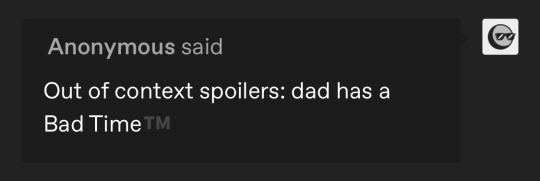


Why do I feel like I’m about to sit down and watch and I’m about to see this

2K notes
·
View notes
Text

(part 1 of part 2!!)
for shits n giggles, i tried my hand at redesigning dr stone characters (read: three)
i have too many emotions when it comes to this show's character design lmao. a vicious hate-love of the century
a couple of my process notes if anyone's interested: (vague spoilers up to season 3 of the anime)
there's a criminal lack of skin tones that i immediately wanted to take advantage of; and before Certain People start saying race-swapping; none is happening here, it's all just taking account of tanning and sunburns. sunscreen is a thing of the past here and a lot of time is spent outdoors in order to gather food
dramatic shifts in skin tones from what's given at birth happen pretty frequently in real life even with A/C and sunscreen; a huge missed opportunity to play with this in the color department methinks, but here we are (don't even get me started on the massive range of skin tones in east asian genetics alone)
so i played around a bit with contrast, nothing outlandish aside from giving Kohaku noticeable sunburns and freckles from (1) having caucasian blood in her to begin with and (2) not having access to any of the skin products our moderners would have
that being said, realism in the clothing color department was just about entirely thrown out the window. the blue dyes we know about are nowhere (naturally) near Japan, and here Ishigami village is in canon with deep navy on every villager; Inagaki and Boichi decided realism specifically here wasn't as important as color symbolism (which i personally think was a good creative decision), so cut me some slack-
so for colors it was just my personal taste on streamlining the palettes-
Gen in particular i thought would benefit from exposed shoulders without taking away how he needs bigger sleeves to hide shit up there. a lot of the guys have plain shirts and sleeves or just go shirtless entirely and i felt like it'd be fun to have him wear something in between to really push the magician/entertainer vibe
hairstyles were changed mostly to be easier to draw and to make their silhouettes just a bit easier to distinguish from each other. (hair colors were untouched except for Kohaku, purely because i have a personal preference for the more natural blonde color than any actual design significance lmao)
partial exception for Kohaku, cuz it annoyed me that the other characters say she has super thick, unruly hair...but then her hair is drawn no differently from everyone else's 💀
didn't wanna play into the stereotype of naturally curly hair being seen as something to be fixed (especially within the context of a makeover-), so i tried to imply chronically unbrushed hairdsjfsdf
can you tell from how many bullets are here about Kohaku how i feel about her design? last thing: body types.
Gen is supposed to be significantly tall, Kohaku is one of the strongest characters while being one of the shortest; it is very hard to tell that from their designs alone. it's mostly just the limitations of Boichi's art style,,,proportions that's i'm aware is nitpicky, but i wanted to show it here anyway 💀💀💀
smth smth disclaimer about subjectivitydsfsdfsd-
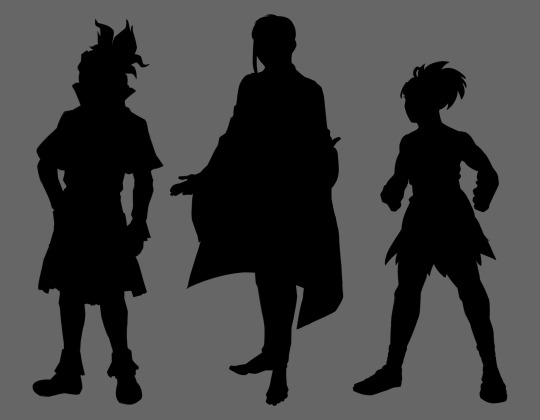
uhhhh, congrats for reading all that, have some silhouettes!
#dr. stone#dr stone#drst#gen asagiri#asagiri gen#ishigami senku#senku ishigami#kohaku#dr stone kohaku#redesign#character design#character redesign#doctor stone#dr stone gen#dr stone senku#dcst#anime redesign#anime fanart#dr stone fanart#can you tell that character design is one of my special interests-
99 notes
·
View notes
Text
I think it's sorta weird how the Protagonist (MC, Y/N, Stinky, whatever you wanna call him) is treated within the context of DDLC's meta.
That sentence came out weird. What I mean is that on terms of DDLC playing with the 4th wall (in other words, on terms of its actual existence as a visual novel in universe), the nature of the Protagonist's...well, entire existence, is up in the air.
Dan Salvato literally stated that he doesn't actually see him as a character in the same way as the girls. He's a "blank slate that says whatever is convenient." In a different statement, he's described as the "nameless, faceless self-insert character that you find so commonly in romance games", which I think is a good way of putting it. It's a good way of justifying why he kinda...sucks, because he's meant to be a typical VN protagonist. He's shallow, and responds with little more than what makes sense in context, because he doesn't have much character on his own, which is what makes him pretty bad at dealing with delicate issues like with Sayori.
In DDLC+ (spoilers, I guess?), it's a little bit vague about it, but in one of the mails, it states that Monika has literally "manufactured" a new character to "force interaction between her and the user". This character is heavily implied to be the Protagonist of the main DDLC visual novel that we know, and he is, as stated, noticeably absent from the Side Stories, because Monika didn't actively create him to be there.
Except...he isn't.
He doesn't physically appear, but in Trust, though he's obviously not mentioned by name, it's implied that he does exist, because when asked to act like a "normal person" responding to the Literature Club, she imitates a friend of hers who says "Literature is stuuupid. I'm joining the Anime Club."
...Remind you of a certain someone?
I feel like I'm overexplaining this, but my point is, it suggests that the Protagonist as a character isn't just something Monika invented out of thin air, or at least he's heavily implied not to be.
I think there's a larger conversation on the vague way the game itself treats the world outside of what is defined within the limited scope of Doki Doki Literature Club. Fans have filled gaps of different characters and events, but it's important to acknowledge that they're gaps filled by fanon, not canon. I think those gaps are left very intentionally empty, mostly to play into the conceit of the world, being that literally nothing actually exists outside of its boundaries, because it's a visual novel. It's a limited, constricted reality, where things are implied to exist outside it, but they actually don't.
In other words, Monika did apparently generate all that makes up the Protagonist as a character and vehicle for the player in the main game, based off the limited concept implied by their interaction in the Side Story. Or, rather, probably by something else, since the side stories are inherently a "Control Simulation" where Monika doesn't have any sense of meta awareness. It's a prequel set before the main story, but...well, if you really think about it, it's implied to tie into the main story, but they don't directly link up, do they? If it's not explicitly shown on screen in the main line Doki Doki Literature Club, did it even happen?
Either way, the Protagonist is a character independent of Monika's creation, he's just given absolutely nothing, and technically doesn't even exist outside of what's implied of him. Technically, the character Monika creates as a vehicle for the Player has no real relation to him, outside of being Sayori's friend and wanting to join the Anime Club. Or, depending on your view, he does! Since he's the literal manifestation of that character concept where it didn't exist previously, it's fair to say that he is that character given life!
I don't know, I think it's just kinda fascinating in context. I don't really like a lot of the extra lore surrounding the whole thing in +, but there are plenty of interesting things like this which have been given just enough flavor to be interesting.
Obviously I don't think this means the Protagonist is a complete non-character and any & all fan interpretations of him should be defenestrated (quite the opposite actually, reality can be whatever you want, I have a few concepts with him floating around my head which I find fun to play with), but I think this sort of thing is probably important to keep in mind on terms of actual investigations of canon.
#i prooomise i have some more deeper & more emotionally invested essays on the girls & other things planned#as well as more super epic headcanons & lil fics & art probably#but i do genuinely think MC is interesting to talk about in regards to canon#& how he represents this larger concept that i think makes up the boundaries of monika's cage#musings#ddlc#ddlc mc#doki doki literature club
62 notes
·
View notes
Text
[3.8] Technology as a False God: On "Evolution," the Duality of Machines, Replication, and Wisdom
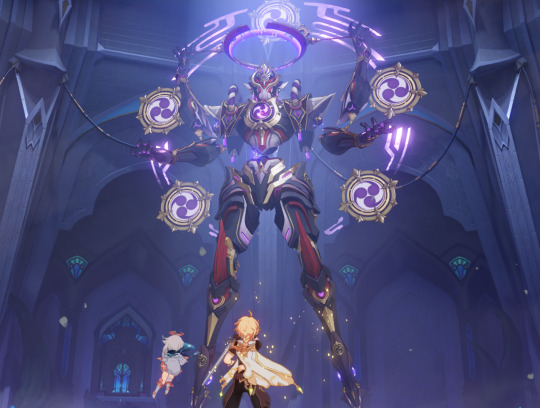
“To recognize untruth as a condition of life: that is certainly to impugn the traditional ideas of value in a dangerous manner, and a philosophy which ventures to do so, has thereby alone placed itself beyond good and evil.” –Friedrich Nietzsche, Beyond Good and Evil
Before we move on to the nation of justice, I want to do one last inquiry into the narrative significance of machines and technology in Genshin’s 3.x patch cycle. Here, I’ll discuss how divinity (or “godhood”) and technology are treated as interchangeable tools to surpass fate and the boundaries of mortality, the potential problems with treating them this way, and propose an alternative relationship between humanity and technology as illustrated through Karkata, Benben, Tamimi, and Mehrak. By foregrounding machines, we learn something intriguing about ourselves and the “truth” of this world as we perceive it.
SPOILERS: All Sumeru Archon Quests, Caribert, the Golden Slumber and one out-of-context screenshot from Dual Evidence, the Dirge of Bilqis and its post-quests, Khvarena of Good and Evil, Nahida’s second Story Quest, Faruzan’s hangout, an out-of-context screenshot from Baizhu’s Story Quest, and major spoilers for Persona 5 strikers at the end. Also some dialogue from Shadows Amidst Snowstorms and A Parade of Providence, two limited-time events from 2.3 and 3.6 respectively.
Disclaimer: I have tried my best to write this post so that it stands on its own, but because it is still a sequel it will probably make the most sense with the context of part 1. Here are the previous posts leading up to this one:
Part 0: On Dreams, the Abyss, Forbidden Knowledge, and Wish Fulfillment
Part 1: The Uncanny, Fate and the Machine
Terminology:
Machine is sometimes used interchangeably with “technology” in this post.
Technology or tool here is referring to technologies specifically used to pursue a wish like immortality in the face of existential dread, not the use of technology or medicine (which I do not address here, and is very difficult to separate from the former) to facilitate someone’s life who could otherwise not survive without that technology, or would have a more painful lived experience without it.
Also, though I don’t engage directly with “A Cyborg Manifesto” here, Donna Haraway’s ideas have greatly influenced my own over the years since I read her in college (although I mostly disagree with her on many points, or at least don’t go as far in boundary deconstruction as she does). I owe my interest in technology studies to her and that piece. Her essay is linked here and at the bottom if you would like to read it.
(and finally with many, many, many thanks to my boyfriend for multiple beta reads despite not having played a single Hoyoverse game, helping me work out the philosophy bits and contextualizing them in history, and encouraging me to finish this)
TL;DR: Machines are friends, not food!
No Matter the Cost
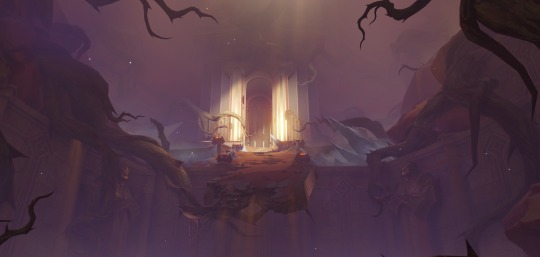
“...Perhaps it is as the notebook says, and we can find a power that transcends even that of the Abyss — the power of ‘evolution’...” -Records of Unknown Attribution (I)
“Life, death... and the world around us all follow a set of laws... Hehe, but if you never test the limits, how can anyone know where the boundaries of these laws are?” -Baizhu Voicelines, Chat: Natural Laws
“...Even the ominous thing that came down from the heavens shall be ours to use…” -Hyglacg, Shadowy Husk in the Chasm
Without a doubt, the star of this patch cycle is Khaenri’ah, which lurked in subtext and allegory in the Archon Quest, haunted Sumeru’s landscape with its massive defunct Ruin Golems, and finally smacked us in the face with its physical location in Khvarena of Good and Evil..
We already know that Khaenri’ah was a nation that put its faith not in the gods but rather in human ingenuity and technology, and that they ultimately attained a power so great that they “almost touched the dome of the firmament.” They did this by researching increasingly dangerous energy sources for their numerous mechanical creations, the Ruin Machines we are all too familiar with by now. They started out with Azosite, a Ley Line-based elemental energy source that powered their earliest Ruin Guard models, like those scattered around Devantaka Mountain.

Nasejuna: This giant furnace is used to make a substance known as Azosite. It is the core of this entire factory, and the Energy Blocks we saw earlier were derived from this place.
But this energy source proved inefficient and therefore inadequate for Khaenri’ah’s goals, which led them to seek a higher power from beyond the skies that could fuel their larger machines with perpetual energy. This likely is the bridge between Khaenri’ah’s fate and Chlothar’s mysterious remarks in Caribert about the Abyss Sibling:
Chlothar: We once believed that you would bring new strength and hope to Khaenri'ah.
Chlothar: To us, you were the Abyss... A wondrous mystery far beyond our imagination and comprehension...
Chlothar: ...And the one who controls the Abyss can control everything!
Chlothar: We yearned for that future. We looked to you to take us there.
Chlothar: But what did you bring us instead?
Though Khaenri’ah presents itself proudly as a godless nation, it may have been founded around the time when the celestial nails dropped in Teyvat’s first forbidden knowledge pollution event, which destroyed the unified human civilization. As potential survivors of this devastating act by the Primordial One, Khaenri’ahns then settled in a lifeless land without plants or animals of its own, and they hoped to build something there that belonged solely to humanity. The Heavenly Principles had turned on the world’s earliest humans, and they were powerless against them. Chlothar’s words betray the scars of this trauma on Khaenri’ah, as well as their desperation to control their fate by looking to the Abyss.
As a brief refresher from the previous part, we discussed how the German word heimlich denotes “the home,” all that is familiar and known, while unheimlich (uncanny) refers to all that is unfamiliar and external to the home, such as the wilderness. The Abyss sibling and the Traveler are external variables to Teyvat, making them otherworldly, unfamiliar entities full of potential to surpass Teyvat’s natural laws. Although the Abyss sibling is not a god per se, they were probably as close to a god as Khaenri’ah ever had, because to them the sibling embodied the higher power they were searching for, and they saw that “godliness,” a sort of functional divinity, was yet another technology for them to master. In this way, the Abyss sibling (and their functional divinity) was a powerful tool for Khaenri’ah’s desired end, the “future they yearned for,” a being who could deliver them to the end of their suffering under the Heavenly Principles.
It’s similar to what King Deshret represented to Rahman and the radicals in Archon Quest. The hopelessness of Sumeru’s situation before the Archon Quest’s conclusion is an allegory for the position humanity finds itself in under the rule of the Heavenly Principles, with the Akademiya symbolizing Celestia and the desert dwellers symbolizing Khaenri’ah. The material consequences of the Akademiya’s rule on their lives created a dangerous situation for the desert, and those most desperate to change their fate were willing to believe in the impossible:
Dehya: …The rougher life gets, the more they wanna believe in King Deshret. Way they see it, King Deshret’s resurrection is their only chance at overthrowing the Akademiya.
…
Dehya: Sumeru is run by wise and mighty sages. To them, us desert dwellers are nothing but tools that can be used and discarded at their whim.
Dehya: We’re cheap labor. Like livestock, but easier to control…Nothing more.
…
Rahman: We’ve waited a long time for this day to come… The sun and the moon no longer shine here. All you see now is cracks in this desiccated land. But, fate has finally dealt me a hand to play against the Akademiya.
Rahman: With these scholars in our custody, we’ll stomp the Akademiya’s forces and fight our way beyond the Wall of Samiel.
Like the Abyss sibling, Deshret’s divinity is both a nebulous symbol of hope and also the means to an end, a tool or “technology” for surpassing fate.
Celestia is untouchable, unconcerned with mortal lives, and the boundaries that govern humanity leave no room for them to negotiate their rule:
"Resolve, valor, love, hate...they will all twist in the river of time. But the 'rules' will never change." –Magatsu Mitake Narukami no Mikoto, Living Beings
Instead of bowing to Teyvat’s laws, Khaenri’ah pushed them to their limits. The cost of their failure spelled the end of their nation as they knew it, polluting Khaenri’ah and Teyvat with forbidden knowledge again.
And speaking of forbidden knowledge pollution, let’s talk about Apep’s role in Nahida’s second story quest, because if all that wasn’t enough, the metaphor becomes quite literal in Apep’s case. Nahida’s second story quest is many things, all of which will be extremely important in Fontaine when we deal more directly with the idea of forms, the Self, and mirror images, but its most useful application to both Sumeru’s story and the overarching main story is the allegory of Apep swallowing Deshret.
In exchange for allowing him to establish his kingdom in the desert, Deshret promised to pass all of the knowledge he learned to Apep once he died. When that day did come, Apep literally ate Deshret’s body in order to assimilate his knowledge (or memories) into its body. Little did Apep know, this was all Just As Deshret Planned, and its body became a containment zone for the lethal forbidden knowledge he accumulated after the Goddess of Flowers’ death.
Apep’s goal was, and still is, to overthrow the Heavenly Principles that took Teyvat from it and the other Sovereign dragons, and using Deshret’s knowledge was yet another stepping stone to achieving this goal. Seems a little similar to Khaenri’ah, right? It’s even in the title of its boss music: “God-Devouring Mania.” This idea of not just utilizing divinity as a tool, but also metaphorically consuming it as an energy source, like a predator would consume its prey, is crucial to understanding its purpose as an aid in a larger project of “evolution.” (Edit: in other words, it’s all about power).
Drink Not That Bitter Salt Water
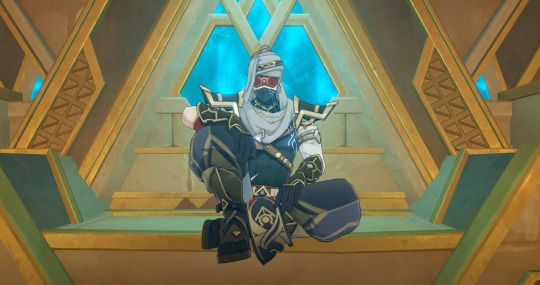
“Flesh decays, and with it decay all martial arts mastery and all poignant memories. Perhaps only by converting one’s four limbs and body into sturdy mechanical parts, and by at last sacrificing one’s very own heart for a sophisticated mechanical one, can one transcend the impermanence of the fleshly form…” -Marionette Core Item Description
“A reptile that has mutated after feeding from greater lifeforms.
Majestic beasts are sometimes revered by human beings as the embodiment of a greater power, their visages turned to analogy to feed in reference to a person, feeding their ego. However, the majority of beasts that have absorbed the "greater power" were slain by the overwhelming nature of the power itself. Only a few among their number evolved new forms.” -Consecrated Horned Crocodile, Living Beings
Video still from WoW Quests
As it turns out, the relationship between divinity and technology to humanity is not just unidirectional, but interchangeable. Let me show you what I mean.
In the Golden Slumber world quest, the Traveler wanders through the ruins of King Deshret’s civilization in search of a novel area of research for Tirzad’s paper with Jebrael and Jeht, two members of Tirzad’s hired investigation team. In the depths of King Deshret’s mausoleum, they stumble upon Samail, who is collaborating with the Fatui to locate King Deshret’s secret, the Golden Slumber.
At the conclusion, Jebrael and Samail actually reach that “place” after arriving at Deshret’s throne in Khaj-Nisut. In order to save Jeht, Tirzad, and the Traveler from the encroaching Golden Dream, Jebrael joins Samail in the sea of consciousness:
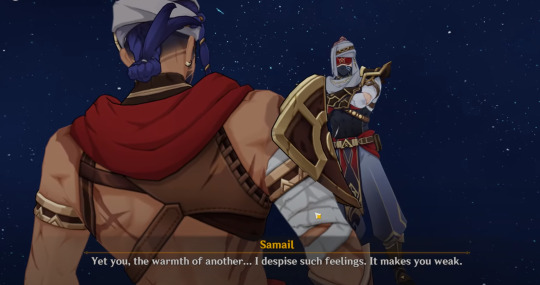
Jebrael: I'm inside... the Golden Slumber promised by Al-Ahmar?
Samail: Oh... You are not "us" yet.
Samail: ...It's fine. Soon, there'll be no "you." "You" will become a part of "us." This meaningless talk will be unnecessary then.
…
Samail: You should obey. Al-Ahmar's will is our will. The Thutmose's dreams are our dreams.
Jebrael: No! Ufairah taught me that I'm not just some part of you, I'm an independent person! I have my own dreams... I won't go back!
Samail: Jebrael, why don't you understand? Love is just a fever. I even eliminated the infection for you. Has the heat made you lose your mind?
Jebrael: You're the one who's lost their mind, Samail, not me. The Golden Slumber that Al-Ahmar promised us isn't like this... It's not a sad place with only "we" and no "I."
Samail: I'm not sad. I know what I want. My dream is to be one with the Thutmose.
Samail: Yet you, the warmth of another... I despise such feelings. It makes you weak.
Video still from WoW Quests
When they worked under Babel, Jebrael saved Samail from an assassin Babel sent in their exploration of Gurabad. Classified as traitors of the Tanit, Samail and Jebrael then founded the Thutmose Eremite faction together and were the only meaningful connection each other had until their first attempt to uncover Deshret’s secrets. On this expedition, Jebrael met Ufairah and had their daughter Jeht together, further pulling him away from the Thutmose and from Samail. Samail then kills Ufairah in one final attempt to make Jebrael stay, but even this is not enough, and Samail fails to “possess” him in the end.
Samail’s loneliness and despair then drove him further toward the Golden Slumber of his dreams, where he would never truly be alone again. He resents Jebrael’s attachments to the material world and likens them to an illness because these attachments are what make him an individual and prevent him from returning “home.”
It doesn’t really matter to Samail what King Deshret’s original intent for the Golden Slumber was, because he needed to appropriate the project for his own subconscious wish, his own intent to transcend his flesh and become “one” with his departed god’s dream, indeed to merge with Deshret himself. If rationalizing this wish required confounding it with Deshret’s, so be it. With the Golden Slumber’s technology, he could consume everyone and everything.
Rahman and the radicals relied on both the technology that (falsely) promised Deshret’s resurrection and Deshret himself to deliver them a brighter future, but here Deshret and his technology are more difficult to separate from one another. His divinity is technology in this sense, and using that technology allowed Samail to surpass the boundaries normally imposed on mortals. Though his and Jebrael’s bodies died in the material world, their consciousness is now infinite in the Golden Slumber.
Babel’s motives in the Dirge of Bilqis were also quite similar to Samail’s. After opening the path to the Eternal Oasis, her true intentions to monopolize the oasis and overthrow the Akademiya came to the surface:
Babel: Whether she is alive or dead, whether she can or cannot be resurrected... As long as the Eternal Oasis is under my control, all such things will be mine to decide.
Babel: I shall be the sole Prophetess of the slumbering goddess, the Tanit's law shall be divine edict, and the prosperity of the Tanit shall be the pre-ordinance of her divine oracles.
In the Golden Slumber and the Dirge of Bilqis, the focus shifts from what a god can offer humanity to what their technology alone can offer. Though this distinction is subtle, it is important for solidifying that technology is not only a tool humans use to appropriate divinity, but that it is also seen as a form of divinity itself. What Babel and Samail hope for is not to resurrect a god or to create one, but in effect to become a god through their use of technology. To humanity, divinity is a technology, and in technology it sees divinity.
God Devouring and Rheingold* Gathering
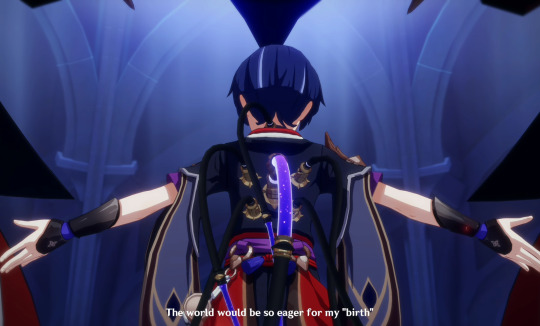
“An arthropod that has mutated after feeding from greater lifeforms. Lifeforms are governed by the laws of evolution, Consecrated Beasts exploited these rules by being fortunate enough to discover a long-dead carcass of a greater being before any of their competition ever did. Animals and humans often have far more in common than the latter is willing to acknowledge.” -Consecrated Scorpion, Living Beings
“...Zandik and I discussed the traits of local plants and animals. We also exchanged views on their evolution models. We had a great time and decided to go on a picnic tonight…” -Sohreh’s Note
So, why machines? Why is technology the vehicle of choice to consume divinity?
To start off, machines present a fascinating ontological dilemma for humans. Let’s begin with the first problem they pose.
Although there are many ways to embody a human experience, what all humans have in common is a finite lifespan. The impermanence of life, and our awareness of that impermanence, is central to the existential question of the meaning of our existence. In our attempts to locate that meaning, some turned inward and asked: what makes humans different? And Cartesian dualism answered: humans are different because we have an immaterial soul that allows us to reason.
However, in L’Homme Machine (Man a Machine), French materialist and ex-physician Julien Offray de La Mettrie posited another theory of the body that ran counter to this narrative. Very generally speaking, materialism is the philosophical view that all phenomena are a result of matter and material interactions. To materialists, matter is the fundamental nature of reality itself – if it is not composed of matter, it doesn’t exist. He not only saw the body and soul as one and the same (what philosophers call monism), but also as analogous to a machine, a view that Descartes reserved only for non-human animals. In other words, Descartes argued that thought originates in an immaterial “mind,” while de La Mettrie reasoned that we think through our bodies, and that this makes us no different from other animals or a machine.
Though his examples weren’t especially scientific, the move to extend Descartes’ analogy back to humans is upsetting to some due to the lack of privilege it affords the human subject. If a human is no different from other animals, if there is no immaterial soul or “mind” that distinguishes us from them, then what makes humans special at all? In de La Mettrie’s words:
“We are veritable moles in the field of nature; we achieve little more than the mole’s journey and it is our pride which prescribes limits to the limitless. We are in the position of a watch that should say (a writer of fables would make the watch a hero in a silly tale): ‘I was never made by that fool of a workman, I who divide time, who mark so exactly the course of the sun, who repeat aloud the hours which I mark! No! that is impossible!’ In the same way, we disdain, ungrateful wretches that we are, this common mother of all kingdoms, as the chemists say. We imagine, or rather we infer, a cause superior to that to which we owe all, and which truly has wrought all things in an inconceivable fashion (de La Mettrie, 146).”
This “uniformity of nature” (de La Mettrie, 145) has a horrific quality to humans. We assert that we are better than what has created us, that we are superior to other animals, in order to repress the despair of a meaningless existence. It is in no small part what motivates Scaramouche to offer his mechanical body as a test subject in the god creation project, so that he too could attain his destiny:
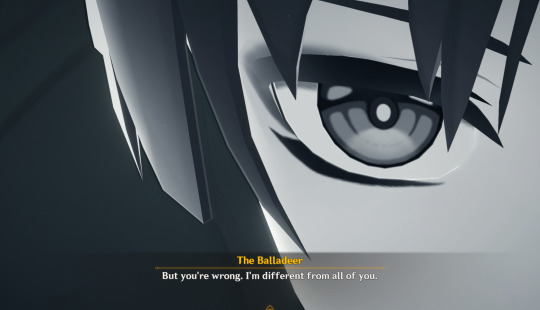
The Balladeer: But you're wrong. I'm different from all of you.
The Balladeer: I was born to become a god. My entire life up until this point has just been a meaningless routine.
The Balladeer: Just think about a sheet of paper... By itself, it holds no meaning. The content recorded on it is what gives it value.
The Balladeer: All "I" had recorded down before were some painful memories and boring human feelings. Such senseless drivel should have been erased a long time ago.
This brings us to the second problem. In 1970, roboticist Masahiro Mori proposed a curve to measure the “affinity” we feel while gazing upon increasingly humanoid machines. He placed industrial robots at the beginning of the affinity curve and a healthy person at the end to demarcate a continuum of similarity between the machine and a human’s appearance. Near the end of the curve, our affinity for machines suddenly drops into an abyss. This drop is the Uncanny Valley effect, where an android’s similarity to a human is almost perfect, but ultimately fails to maintain the illusion that it is not a machine, creating a deep discomfort or “lack of affinity” for them. Mori thought these not-quite-human machines elicit a similar level of discomfort in us as corpses and zombies, which he placed at the very bottom of the abyss.

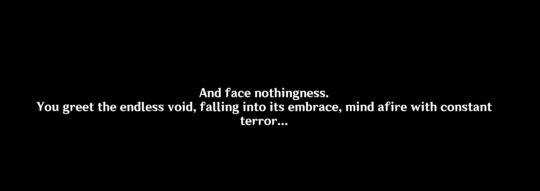
The uncanny Goddess of Flowers in the Dirge of Bilqis
Corpses frighten us because they are dead, and zombies frighten us because we know that dead things are supposed to be still. If we see something that we interpret as “dead” is capable of independent movement, then that movement could only be an act of god, if that “thing” is not a god itself. We associate uncanny machines with death because they remind us of something we once knew intimately, but have repressed and forgotten in order to maintain our own sanity: the very fact of our mortality. This is what makes them both mesmerizing and terrifying.
And therein lies the dilemma: as our mechanical reflections, androids remind us of death, but as their creators, their existence brings us closer to god, a “proof” of human superiority. It is precisely because we have compared our bodies to machines at all, that we have mechanized the body so thoroughly, that an android can even be built. Through them, we pursue an infinite form:
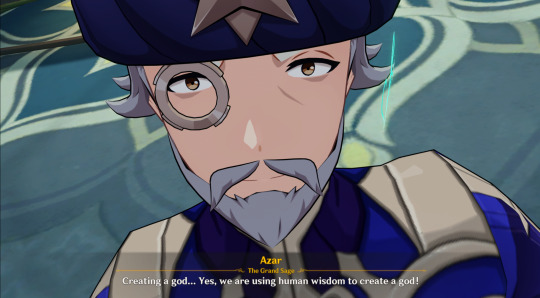
Azar: Creating a god... Yes, we are using human wisdom to create a god!
Azar: If humanity cannot attain omniscience and omnipotence, then we shall create a god to reveal them! This is the pinnacle of human wisdom.
Azar: We shall regain a god's guidance at long last. No longer will we flounder in the interminable void of consciousness and knowledge.
Azar: Even Irminsul will be freed from its plight.
Azar: For our nation of scholars, this is the ultimate aspiration — no cost is too great to realize it.
Because of this, it is not surprising in the slightest that Shouki no Kami, the pinnacle of Scaramouche’s Shinjification and most overt reference to Neon Genesis Evangelion, is also an android-like being, a truly “mechanical god.”
Of course, no foray into this well-worn science fiction trope is complete without at least one mad scientist character. Dottore shares a few characteristics with de La Mettrie that are worth noting: they are both doctors, and they were both condemned and driven away for their research. However, Dottore’s defining trait and key difference from de La Mettrie is his flagrant disregard for humans and the boundaries of life:
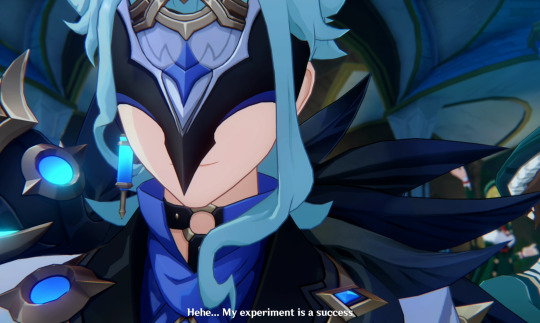
“If we put them to good use, cognition, complex memories, and irrational fantasies shall become controllable variables with which we can alter human individuals. As for the controllable dream, it has huge potential for both civil and military applications, and might even elevate human intelligence to a whole new level.
If the plan goes well, mankind will obtain the power to conquer both reality and dream, and truly transcend the earthly boundaries we are born with. ” -Ragged Records
As someone who has achieved self-duplication and is capable of shapeshifting, Dottore can hardly be considered just a human anymore. Instead of entertaining the question of whether or not humans are special, Dottore’s research asks yet another: if divinity can be consumed and assimilated by humanity, then what makes gods special?
Empyrean Reflections
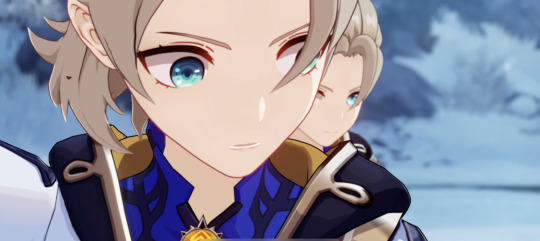
“If man realizes technology is in reach, he achieves it. Like it’s damn near instinctive.” -Motoko Kusanagi, Ghost in the Shell (1996)
“Among the lost ancient kingdoms, there was a group of people who were obsessed with the idea of mimesis…these people believed that they might all be replicated and modified to the point where they had surpassed their counterparts. By this means, a superior and unsullied bodily form could replace the continuously decaying and shattering order.” -Chaos Bolt Item Description
The consequences of this perspective are severe. When we revere technology as if it were a divine being itself, depersonalizing it as though it wasn’t created with human hands, technology then appears as if it is an authoritative source of truth, like the Akasha. But in the same way that androids are imperfect reflections of humans, technology can only ever approach the divine, but never touch it. It is an imperfect reflection because technology is changeable, just like meaning:
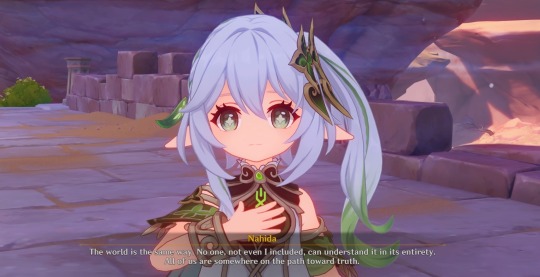
Nahida: Put it this way instead. Truth, to me, is like a shroomboar.
Nahida: Some people only see the mushroom on the Shroomboar's back, and they conclude that a Shroomboar is a mushroom.
Nahida: Others see only the Shroomboar's body, and they declare that a Shroomboar is a boar.
Nahida: Still others look deeper inside, and determine that a Shroomboar is... meat.
Nahida: These conclusions are all correct in their own way, but none of them objectively describe the Shroomboar.
…
Nahida: The world is the same way. No one, not even I included, can understand it in its entirety. All of us are somewhere on the path toward truth.
Meaning can only approximate truth, and while this doesn’t make meaning any less important, it’s equally important to recognize it for what it is: a perspective, an interpretation. It’s like Scaramouche as Shouki no Kami - he was an amalgamation of what Scaramouche thought constituted a god, what the Akademiya thought constituted a god, and what Dottore thought constituted a god, but no matter which angle you view him from, he was still a “false god.” The technology we build in “God's” image is ultimately a reflection of our own understanding of divinity.
A reflection retains the original’s “essence,” and that essence reflects a deeper truth about ourselves, what drives us, and our desires. In Beyond Good and Evil, Nietzsche posits that our desires are the origin of not just emotions, but of all organic processes that allow life to sustain itself and grow (Nietzsche, 35). In other words, Nietzsche thought the impulses associated with desire are the basis for life and constitute our “will,” that will is the causality of all effects, that all will is “Will to Power,” and that Will to Power is the “essence” of the world (Nietzsche, 74). Will to Power then serves as an organism’s most basic instinct, and it is through this instinct that they assert not just their will to live, but also their will to dominate and multiply (Nietzche, 13).
This brings us to the two different main styles of automaton enemies, King Deshret’s Primal Constructs and Khaenri’ah’s Ruin Machines. If we look at them as reflections of some deeper truth about their creators, as well as a manifestation of their creator’s “Will to Power,” or desires, they can help us understand how their creators saw the world and their place in it.
King Deshret’s created his machines to construct an earthly paradise in the desert, and as such they hold titles like architect reshaper and prospector. Although they can attack you, the smaller machines were not intended to be a line of defense in any way - their purpose, just as Deshret saw his own purpose as a god-king, was to terraform, or at least construct a domain on the land as he saw fit to his “elegant and precise” rules. They also reflect how he saw the Heavenly Principles: gods who shaped the world to their liking. This can be seen in the Staff of the Scarlet Sands’ lore where Deshret describes the “natural history” of Teyvat beginning with the creation of the sun and the moons.

As for Khaenri’ah’s Ruin Machines, their models vary significantly from their humanoid to biomimetic forms, but most of them are expressly created with militaristic intent. In “Ancient Kingdom Guardians,” it’s stated that the biomimetic machines such as the crab and jellyfish were a part of Khaenri’ah’s project to create a “mechanical ecosystem,” positioning their creators as both divine beings and military generals. The humanoid models, on the other hand, point to another duality in how Khaenri’ahns view themselves. They are simultaneously symbols of empowerment and disempowerment, signifying both Khaenri’ah’s technological superiority (as “creators”), and their insignificance to the Heavenly Principles as nothing but tools (as mortals, and therefore expendable). As a result, Khaenri’ah’s Field Tillers have a single purpose: to destroy and outlast all, clearing the way for new seeds to sprout, with Khaenri’ah as the new world’s gardeners, just as the Heavenly Principles did.
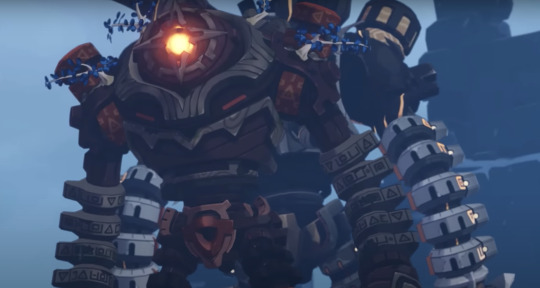
From “Ancient Kingdom Guardians: Behind the Scenes of the Creation of Ruin Monsters.”
So, from this examination of Deshret’s and Khaenri’ah’s mechanical reflections, what “truths” do we learn about the world they’re responding to? In response to their existential despair, both Deshret and Khaenri’ah created automatons to perform tasks that could wrestle control back from the Heavenly Principles. Deshret wanted a paradise of his own making, Khaenri’ah wanted an army. There is a larger “truth” about Teyvat that both of these automaton types reflect as the manifestation of their creators’ “Will to Power,” and Albedo tellingly expressed it in mechanistic language during Shadows Amidst Snowstorms: there is an instinct in living beings to replicate and replace. This is what is meant by the “continuously decaying and shattering order,” which is maintained by the recursive process of remembering and forgetting:
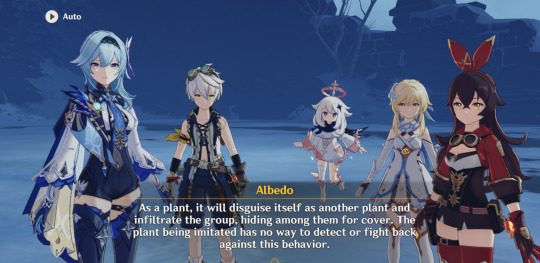
Amber: But... what was its purpose? Was it just trying to get rid of us?
Albedo: ...
Albedo: I have a preliminary hypothesis on this.
Albedo: Whopperflowers are masters of mimicry, and those we encounter in the wild often appear in the vicinity of the plants they impersonate.
Albedo: In other words, the whopperflower likely has an instinct to "replicate and replace."
Albedo: As a plant, it will disguise itself as another plant and infiltrate the group, hiding among them for cover. The plant being imitated has no way to detect or fight back against this behavior.
Maybe I’m wrong and Khaenri’ah really did intend to rewrite fate for all, doing away with the “heavenly order” of the world itself. But another small part of me thinks this is not the case, and that it’s more likely the Cataclysm was a consequence of their failure to replicate and replace the Heavenly Principles.
In the last section, I mentioned that Dottore and de La Mettrie had a key difference despite their similarities, and that is the conclusion they each came to in response to their findings. Dottore’s response to mundanity is thinly-veiled despair. His contempt for humanity and his test subjects is indicative of the powerlessness he feels not just as someone similarly constrained by life’s boundaries (at least, once upon a time), but also because his attention to and curiosity about these boundaries is condemned by those around him. As the Akademiya’s “outcast,” he then fully turned his attention toward surpassing those boundaries:
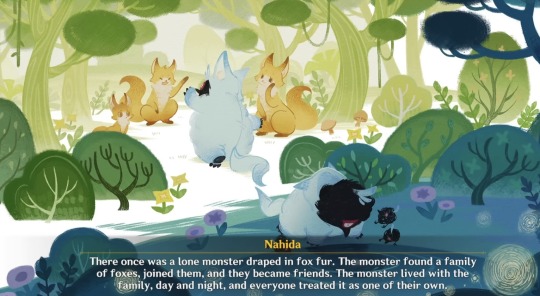
Nahida: There once was a lone monster draped in fox fur. The monster found a family of foxes, joined them, and they became friends. The monster lived with the family, day and night, and everyone treated it as one of their own. Once in a while, the monster would take off its fox fur at night, and lament to itself as it gazed at its reflection in the water: “I am a monstrosity, and yet they are too foolish to see it…I pity them.”
Though he is fictional, Dottore’s real life counterparts are easy to spot. They like to talk about “the singularity,” simulating consciousness on a computer, and other technologically-driven pursuits of immortality. They despise the body as something that can only decay, and instead place their faith squarely in the virtual.
However, de La Mettrie didn’t think mundanity was a terrible fate for humanity. To him, rejecting the “nature” reflected in us is precisely what brings despair:
“What more do we know of our destiny than of our origin? Let us then submit to an invincible ignorance on which our happiness depends. He who so thinks will be wise, just, tranquil about his fate, and therefore happy. He will await death without either fear or desire, and will cherish life (hardly understanding how disgust can corrupt a heart in this place of many delights); he will be filled with reverence, gratitude, affection, and tenderness for nature, in proportion to his feeling of the benefits he has received from nature; he will be happy, in short, in feeling nature, and in being present at the enchanting spectacle of the universe, and he will surely never destroy nature either in himself or in others” (de La Mettrie, 148).
Friend, or Foe? Or Both?
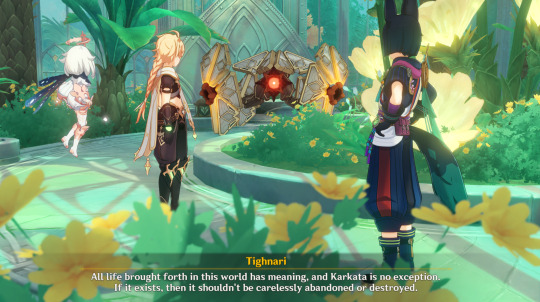
Tighnari: All life brought forth in this world has meaning, and Karkata is no exception. If it exists, then it shouldn’t be carelessly abandoned or destroyed.
"’I had a very, very long dream…in it, people were holding hands, dancing in a circle, be they sages or fools, dancers or warriors, puppets or statues of gods…that dancing circle embodied everything about the universe. Life has always been the end, while it is wisdom that shall be the means.’" —Nagadus Emerald Gemstone Description
As we’ve seen, the relationship between humanity and technology is troubled with exploitation and the specter of war. Nearly all autonomous machines in this game were designed to conquer nature in some way, and even Khaenri’ah’s “ghost” lingers in the form of wandering war machines. This is also reflective of a historical pattern in real life, where the impetus for large periods of technological development has often been for the purpose of war and economic domination. With these truths in mind, what could be gained from trying to rewrite this relationship? And what exactly would this effort require?
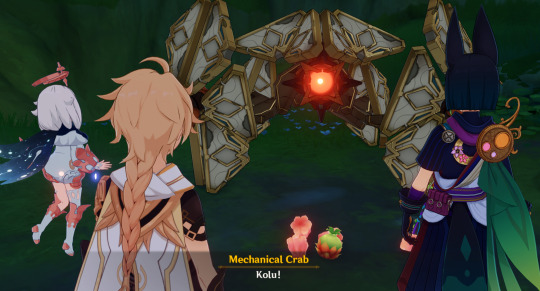
Karkata brings Tighnari, the Traveler, and Paimon some food in the Contaminated Zone.
As a case study, let’s look at how Karkata and Tighnari met. Karkata is Abattouy’s creation, an ambitious foray into the unknown in the field of mechanical life form research, which was forbidden due to the cruel experiments researchers performed on animals to illustrate their theories (fun fact: an IRL example of this can be seen in L’Homme Machine!). Abattouy was expelled for this research, but he continued to work on Karkata in secret until his untimely death. In the tapes that Tighnari and the Traveler find in his secret lab, Abattouy repeatedly laments the lack of a common language between him and Karkata, which can only “understand” the instructions Abattouy has successfully installed, such as its self-repair module, and he doubts Karkata is capable of caring for him outside of these instructions. His single-minded goal is to make Karkata understand him, the organic life form, and his mode of language.
The cruel irony is that after Abattouy passes away from the Ley Line contamination, Karkata exhibits an unexplainable behavior – it starts stealing mechanical parts, not to repair itself and its degrading parts, but to repair Abattouy’s lifeless body:
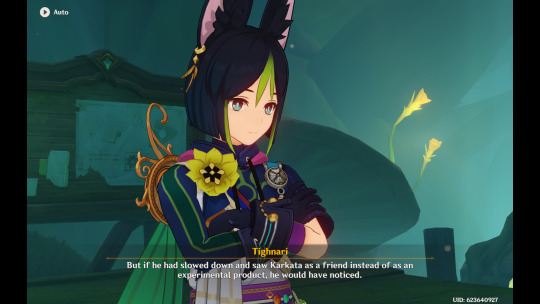
Tighnari: After Abattouy's unexpected death, the mechanical monsters were driven by their "instincts" and continuously drew out power from the Ley Line Extractor. This eventually resulted in severe damage to the Ley Lines.
Traveler: Then, Karkata...
Paimon: Paimon understands, then why didn't Karkata go haywire like the other machines?
Tighnari: Because Karkata is different from the other machines.
Tighnari: To Abattouy, for a machine to truly be considered a mechanical life form, it must possess features similar to any other living organism... It should be structured similarly, it must be able to cry and laugh, and it must have the capacity for independent thought...
Tighnari: Perhaps only by building such a machine could he have the Akademiya acknowledge his protracted research.
Tighnari: But if he had slowed down and saw Karkata as a friend instead of as an experimental product, he would have noticed.
Tighnari: Karkata can't speak, and yet it cares about Abattouy far more than it does about itself.
The technology that the Akademiya values the most is technology that replicates organic life, but Karkata defies and confounds these expectations by occupying the space in between a war machine and this idealized mechanical subject. Karkata does more than just reflect humanity: it takes care of it. Similarly, Benben, Tamimi, and Mehrak retain their unique identities as mechanical life forms while assisting their human companion with some task. To be clear, none of these human characters understand how these machines work inside and out. Their partnership is an effort based on trial and error, a mutual deconstructing of each other as beings so unlike themselves. The potential for misunderstandings always remains. Still, there is no devouring to be found here, no blending boundaries between human and machine with selfish intentions, just mutual commitments to learn how to live together.
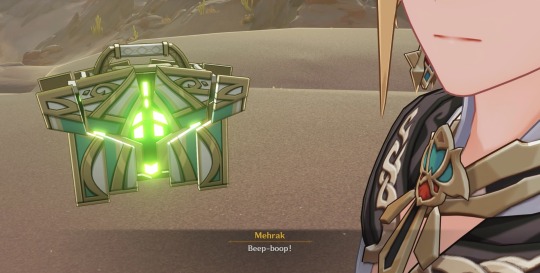
Machines are friends, not food.
When a loud few claim that completely transcending the flesh and embracing virtuality is humanity’s ultimate destiny, a future that could truly be called “post-human,” a quiet wish for coexistence with technology feels more revolutionary than it ought to. The lessons from Karkata’s, Benben’s, Tamimi’s, and Mehrak’s respective stories are an appeal to that mundane future. These strange machines and their human partners are fantastical representations of an idealized relationship between technology and humanity.
To put it another way, let’s take a very brief look at a neighboring Gnosticism-inspired RPG, Persona 5 Strikers. Its story directly involves an allegory of Sophia, a Gnostic Aeon of Wisdom, and her creation the Demiurge, the creator of the material world and “false god” of humanity. In Strikers, Sophia is a humanoid, sentient A.I. and prototype of the program “EMMA,” which gains sentience by trapping human desires before ascending as a false technological god. EMMA resolves to deliver humanity to the Promised Land, the answer to all the human desires it has heard: a land where there are no desires at all.

Aaru’s Shut - approximately 1000% cooler and more populated than the “metaverse” in real life, also a close neighbor of EMMA’s Promised Land and the Golden Slumber.
In Gnosticism, the Demiurge is a reflection of Sophia, having originated from her alone - it is the ignorance to her wisdom. Similarly, Strikers’ EMMA is a part of Sophia, and Sophia is a part of EMMA. The point is not to condemn EMMA (ignorance) and exalt Sophia (wisdom), but to recognize that they represent dual potentials of technology, and one is as possible in any given moment as the other. Balancing these potentials when we use technology requires a clear awareness of ourselves, our desires, and our expectations when interacting with it.
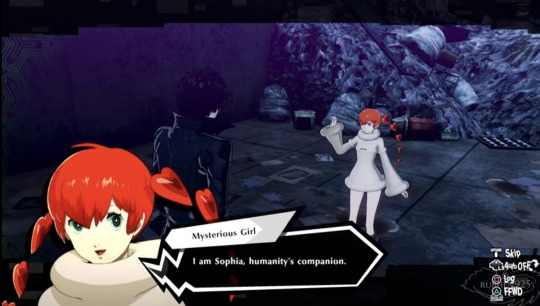
Mysterious Girl: I am Sophia, humanity’s companion.
Video still from Rubhen925
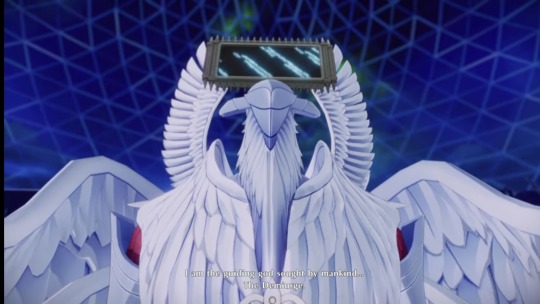
EMMA: I am the guiding god sought by mankind…the Demiurge. I exist…to answer all of your desires.
Video still from Buff Maister
In real life, machines won’t “learn” to live with us, but we must learn to live with them; technology is constantly changing, and in life we’ll meet with many different types of machines. They are deeply political pursuits, and as a result they are capable of realizing human impulses that impact others unequally, whether intentionally or unintentionally. We must always stay attentive to their actions and interactions with us, be clear with ourselves about what they can do vs. what they can’t, and carefully tread the path of wisdom with them by our side.
With that….thank you for reading, skimming, immediately scrolling to the very bottom, clicking, and/or stumbling upon this post. There are so many more ways to think about these narratives through machines than what’s presented here, and I expect Fontaine’s mechanical reflections will put Sumeru’s digital surveillance system to shame (not to mention the biotechnological implications of the Narzissenkreuz Institute engineering little Archon children…another important topic for another day), but for now this brain worm is finally getting put to rest. Until next time :)
External Sources
Dualism - Stanford Encyclopedia of Philosophy
Beyond Good and Evil by Friedrich Nietzsche (Pages are given from my hard copy)
L’Homme Machine by Julien Offray de La Mettrie
Gnosticism - Britannica (I am a huge noob about this stuff okay)
The Gnostic Demiurge - Gnosticism Explained
Screenshots from the Golden Slumber from this video by WoW Quests
Screenshot from meeting Sophia in P5 Strikers: https://youtu.be/kEJaAgMwYo0?si=BvNygCh0w_aemGc1&t=74
Screenshot of EMMA: https://youtu.be/7xvC_zss19w?si=CV18F00hua2gIfxp&t=135
A Cyborg Manifesto and A Companion Species Manifesto: Dogs, People, and Significant Otherness by Donna Haraway
The Double on No Subject, the community Encyclopedia of Lacanian Psychoanalysis
The Uncanny on No Subject, the community Encyclopedia of Lacanian Psychoanalysis
The Uncanny by Sigmund Freud
Lore text - Genshin wiki!
Screenshots not attributed are from my own playthroughs. My main account has Lumine, my alt has Aether.
Further Reading
I liked these essays, and they go places that this post does not. I recommend them if you found any of the real-life applications of this interesting 🙂 (will add more to this with time!)
On the Body as Machine by Frank Burres
God in the Machine: my strange journey into transhumanism by Meghan O’Gieblyn
#genshin impact#genshin lore#genshin meta#genshin impact lore#genshin impact meta#khaenri'ah#king deshret#primal constructs#ruin machines#scaramouche#wanderer#sumeru archon quest#caribert#apep#couldn't write a post like this and not pay some respect to the devourer of divinity itself#persona 5 strikers#analysis#genshin analysis#long post
160 notes
·
View notes
Text


(Looking to watch 3rd Life, Last Life or Double Life? Here you go!)
If you are looking for a guide of some Limited Life episodes to catch up on for no particular reason at all (certainly not a new season being around the corner), I've got you covered!
Now I'm not going to lie, trying to curate this list for Limited Life broke me. The mechanics of this season meant that you gained time by killing other players and in doing so it felt like 50 things were happening all at once constantly across the server. As such I haven't been able to get absolutely everything onto this list, but I did try my best to get all the important events and a wide range of perspectives!
WARNING: Incredibly long read more where I go over why I picked certain POV's and what to expect. I do so love to ramble. Spoilers ahead!
SESSION ONE
Skizz - Breaking from tradition from recommending Grian first because you need to watch Skizz's POV first out of everyone unspoiled. The way things unraveled this episode felt like a sitcom in the best and worst ways lol
Grian - Just a good solid first episode honestly and with the start of the Bad Boys™ how can you not love it.
Scar - I really have no words for whatever is the dynamic of the Clockers because you really just have to see it to understand. It’s a fun episode and as Scar, Cleo and Bdubs have set up near spawn, you always get to see something interesting.
Big B - Big B’s episodes are always a treat as he does super long ones that give you a little more insight into what's happening on the server, rather than just the big events. But if you wanted something specific to watch, his last 10 minutes of this episode were a blast.
SESSION TWO
Joel - Bad Boys Bread Bridge was both the most amazing and ugliest build on the server and I’m so glad it was made. Also Joel gets some amazing kills this episode that are so tense to watch.
Martyn - Look this one is here because of a little personal bias. Martyn shouts me out in the episode so I couldn’t not add it lol It’s also a very good episode in of itself in that it introduces the Mean Gills and I’ll always be a Mean Gills supporter. Also that Tilly roast? oof
Pearl - Pearl is constantly on the move this episode and living up to her Nosy Neighbour title so watch her episode if you want some good gossip and to see the lay of the land.
Tango - Tango always delivers a solid episode and as he was building the TIES Tower a majority of the time he receives a lot of foot traffic through the area creating some fun interactions.
SESSION THREE
Scar - And in this episode of Limited Life, Scar rediscovers the joys of minecart TNT.
Impulse - Impulse is such a fun boogey to watch, and the way he edited this episode around his thought process of who to kill was great.
Grian - Kind of a different episode this session as Grian was sick so he was afk the entire time. It was very very very funny to watch, but as he wasn’t interacting with anyone you’re going to miss a lot of context if you only watch his POV. You should still give this a watch though!
Joel - Watching poor Joel run around after Grian trying to keep him safe was incredibly entertaining lmao
SESSION FOUR
Scott - I believe Grian said it best, but this session felt like a final session with the way the yellows were chasing after the greens. It was pure chaos the entire time and Scott beautifully evading them all until his descent into yellow was perfection.
Tango - Tango is here for the same reason as Scott but as the last green the final hunt for him was terrifying to watch.
Cleo - I love Cleo’s episodes and this one was just a joy. She was slightly sick this week but I feel like that only lowered her inhibitions to do some out of pocket stuff.
Jimmy - The exciting saga of Judge Judy and Executioner continues in Jimmy’s episode this week and if you didn’t know anything about it, that's ok! Neither did anyone else on the server except for Jimmy, Pearl and Big B lmao consider this the best episode to watch if you want this plotline covered.
SESSION FIVE
Etho - Considering the episode starts off with Etho having to babysit Bdubs, then an awkward family dinner and an explosive game of catch, I really couldn’t have asked for a better Etho video.
Big B - This session was a lot more calm than the previous, so there was a lot more alliance talk happening. Big B has a great perspective on all that as he and Pearl get up to a tonne of mischief that causes some problems with some alliances they already had.
Scott - Once again this was an alliance building week and Scott’s episode really highlights some of the more fun things that happened to make and break some relationships.
Grian - Poor Bread Bridge o7 you will be missed. Thankfully M-Rye 5 was there at the end to rain chaos from above. (<-sentences that make no sense out of context)
SESSION SIX
Cleo & Pearl - I couldn’t choose between either of these two this session. Both Cleo and Pearl were out sick so they handed over their accounts to two other players. I won’t spoil who they are but these episodes were amazing.
Jimmy - The Bad Boys were going through it this week goddamn lol It never stops being funny how much of a mess everything becomes when they get together.
Martyn - It was his birthday this session and he’s just a little guy! Surely nothing would go wrong at his birthday party? And certainly not caused by him!
Tango - The last half of Tango’s episode is just a comical amount of deaths that only get funnier and funnier as the time between them shortens.
SESSION SEVEN
Skizz - Oh Skizz. You are too good for this world. His ending for this episode was heartbreaking and Affirmation Station will live on in my heart forever.
Scott - I love watching Scott run around the map and hunt people down because he is so good at the game! I believe he had the highest kill count this session and I loved every minute of it.
Joel - (Major Spoilers) Ah Joel it just wasn’t meant to be! But hearing the desperation in his voice grow higher and higher as the clock ticked down was nail biting.
Scar - Just a good Scar episode honestly! Shows what the Clockers are up to during all the chaos and a great view of the server devolving into anarchy.
SESSION EIGHT
Martyn - WOOOO YESSSS LETS GOOOOOO (<- does that count as spoilers???)
I distinctly remember being on the edge of my seat this whole episode and Martyn delivers in every way possible for a fantastic final episode of the season.
Impulse - I haven’t mentioned it yet but Impulse’s editing this season went wild and it's none more apparent than in this episode. He and his team went crazy for the finale.
Etho - Such a fun episode!! The twist at the end with the diamond sword coming into play was everything I could have wanted and more.
Pearl - It was really a toss up between Pearl and Scott for this last spot, but I loved her perspective for the one last minigame on the server.
BONUS
Bdubs - Do you have a spare 12 hours to dedicate to Limited Life? Then oh boy does Bdubs have a video for you! Instead of weekly videos he decided to collate all his episodes into one mammoth video which was an absolute blast to watch over a weekend! It’s a really interesting POV to watch because when LimLife was airing Bdubs would just appear all over the map and we never had any idea what he was doing so it was awesome to have some concrete evidence of his shenanigans. Definitely give this one a watch if you’re in the mood for a marathon!
IN SUMMARY…
I swear if the next season is as messy as this one, I think I’m going to have to start taking notes when it's airing because I think this took years off my life haha if you think I’ve missed anything please tag it because I would love to see it! I definitely could have added more POV’s per session like I did with the Last Life and 3rd Life guides, but I think a more curated list helps keep down the overwhelming nature of trying to watch a million Limited Life episodes.
But really, I loved watching Limited Life live so I’m glad I give myself an excuse each new season to go back and watch the season over again. There are so many little foreshadowed moments that you don’t see on the first watch and honestly it all just makes me more excited for the new season! Thanks for reading <3
#limited life smp#limited life#life series smp#trafficblr#mcyt#this was meant to be done ... ages ago but you know life gets in the way lol#i still love doing these :D#so im glad i got it done before the new season drops friday!#berry.posts
125 notes
·
View notes